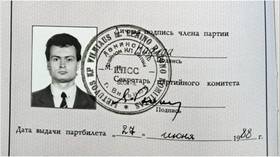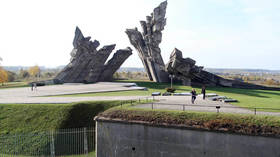Baltic state’s president embroiled in Communist scandal

Lithuanian President Gitanas Nauseda did not disclose that he had joined the Communist Party in the same year that his country began its push to leave the Soviet Union, documents published on Wednesday revealed.
Ties to the Communist Party of the Soviet Union (CPSU) are a controversial issue in modern Lithuania, where the authorities view the country’s time in the USSR as an “illegal occupation.” Some former members of the KGB and Soviet police were barred from holding certain public offices after Lithuania regained independence in 1991.
Nauseda’s records were published by Laisves TV journalist Dovydas Pancerovas, who said they had been discovered in the state archives. According to the documents, Nauseda, who was in his early 20s at the time, applied to join the CPSU on May 20, 1988, and received his party ID card on June 27 of that year. Sajudis, the political movement seeking Lithuania’s independence, was officially launched on June 3, 1988.
“I do not believe and do not claim that belonging to the Communist Party is an indelible stain, but President Nauseda tends to associate himself with Sajudis and its rallies in his political speeches, although he actually joined the Communist Party at that time,” Pancerovas wrote on Facebook.
The journalist originally argued that the documents revealed that Nauseda “had chosen the opposite side of the barricades, at least formally” during a time when others in Lithuania were backing Sajudis. Pancerovas later edited the post to suggest that CPSU membership alone “did not mean choosing the other side.”
He noted, however, that Nauseda had failed to mention his association with the CPSU in a questionnaire submitted to Lithuania’s Central Electoral Commission when he ran for president in 2019. Instead, he left the section about his past or present political affiliations blank.
The president’s office said in a statement on Wednesday that Nauseda had joined the CPSU, but “once Sajudis was launched, [he] did not take part in the activities of the Communist Party.” The office added that the question about past political affiliations on the questionnaire was optional.














